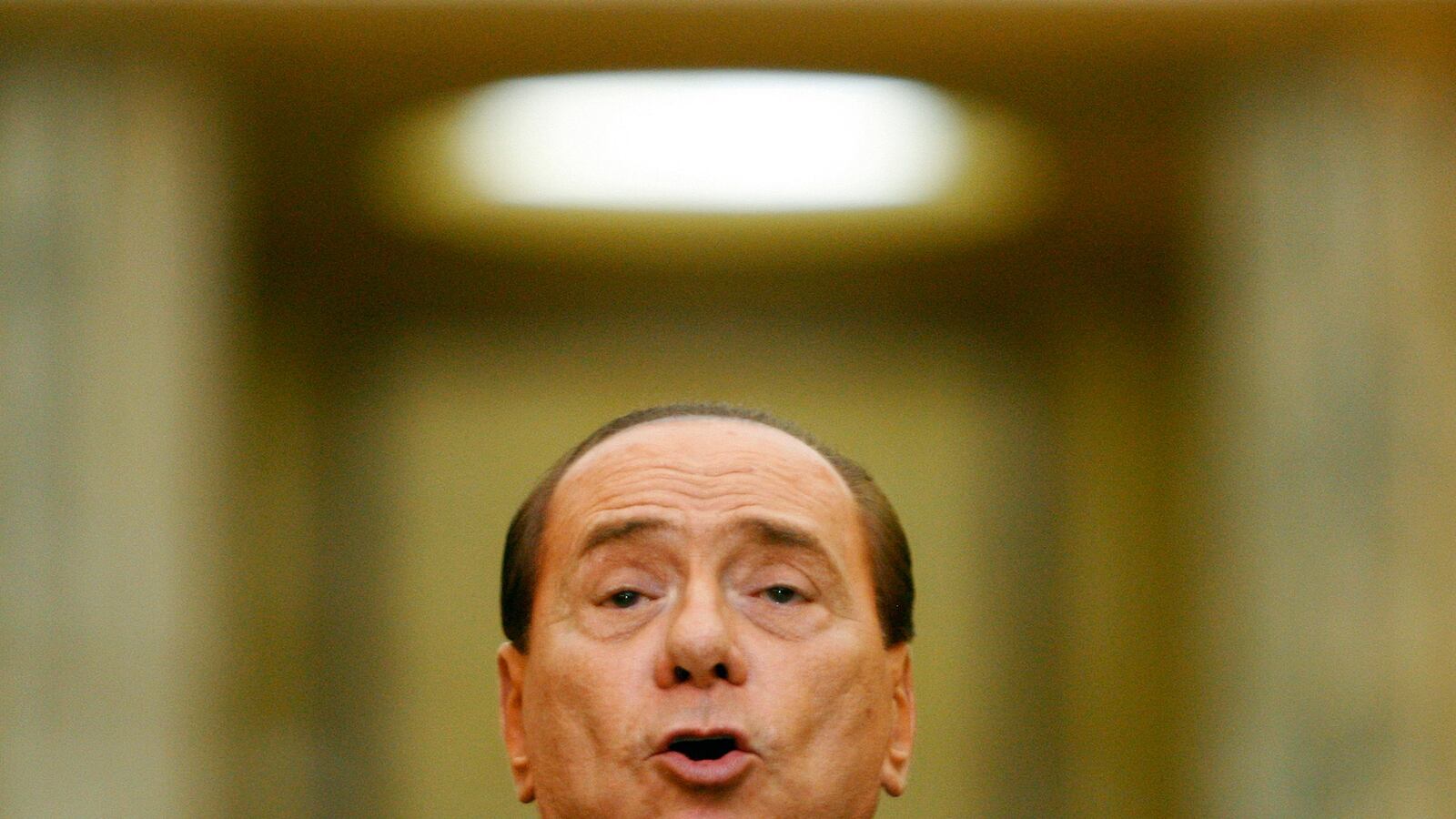ROME — Before Silvio Berlusconi invited journalist and author Alan Friedman to inspect the parlor of his Milan villa where the famed “bunga-bunga” parties took place, he asked him, “Do you have the courage?”
Friedman, who had been given an all-access backstage pass into the life of the media mogul, playboy, and thrice-elected Italian prime minister to write his authorized biography, My Way: Berlusconi in His Own Words, understandably jumped at the chance. But rather than focusing on the details like the abundance of ornate art and lack of sex apparatuses we’d all come to expect in a place famed for its wild forays that included pole-dancing women and strippers dressed as nuns and Barack Obama, Friedman writes about how Berlusconi is a “matador, a one-man show, a spectacle of energy and humor” as he shows off the notorious salon, which he concludes is really just a banquet hall.
In fact, it was the way the 79-year-old prowler said the words “bunga-bunga” that most impressed Friedman. “When he pronounced the words ‘bunga bunga,’ the B-letters burst, the syllables vibrate, there is a sparkle in the air like the sound of plucked strings of a double bass,” Friedman writes, both giving the old geezer a pass and putting some flesh on the caricature that is Berlusconi by bringing his sound bites to life.
Berlusconi—who has never publicly talked about the parties that got him convicted (and acquitted) of paying for sex with the underage Karima Rashida El Mahroug, known by her working name as Ruby the Heart Stealer—admits to being a “natural seducer,” though he claims not to have touched the young woman for whom he nearly went to prison for seven years. He also denies most of the sex allegations laid before him, but he admits to Friedman a number of details that might better be kept secret, among them, that that the term “bunga-bunga” comes from a sick joke he and Muammar Gaddafi cooked up that involves savage anal sex and a tribal dance. About all the sex that was supposedly had during the parties? Berlusconi says it was just dinner, and then adds, “This is a private home, so if there was any sex being had, it is not a crime.”
While there might not be a great deal of substantive discovery when it comes to understanding Berlusconi, who seems to be seeking a better legacy than the one painted in the vast library of books written about him, it does offer fascinating glimpse into his life, including details about how many world leaders gave Berlusconi their time.
Among them, perhaps his best friend and “spirit twin” George W. Bush, who Berlusconi claims he tried to talk out of invading Iraq by inventing a children’s fable set in a forest involving a lion (Bush), a fox (Kofi Annan), a wolf (Saddam Hussein), a Swedish eagle (Hans Blix), and, oddly, a pack of Marlboros used to illustrate the danger in invading Iraq.
Bush, according to Berlusconi as told to Friedman, replied to the lengthy fairy tale with, “Yeah… I’m gonna kick his ass!”
For all the ink spilled on his love for Bush, Berlusconi’s greatest bromance seems to be with Vladimir Putin, who he visited in July with Friedman in tow. Friedman describes the Russian president’s mannerisms and even his attire down to his shiny shoes with quirky detail. The three discussed U.S. presidential hopefuls Hillary Clinton, Donald Trump, and Jeb Bush over seafood canapes, pirožki cabbage, and apple sandwiches, though no mention is made about just who Putin thinks ought to win.
Here, Putin seems just as awestruck over “Silvio”—who he calls by first name—as they sit at the Kremlin and reminisce about the parties at Berlusconi’s Villa Certosa in Sardinia, including one in which a few rogue fireworks nearly wiped out some of the female guests. During this conversation, Putin also lauded Berlusconi’s chef and the high quality of Italian cuisine, especially under Berlusconi’s gastronomic guidance.
Among the talk of truffle pasta, Friedman also interjects a few details about how appreciative the Russian leader always was for Berlusconi’s support in their “strategic partnership” for the continent. “He is a person who is very correct and who has always pursued a consistent policy,” Putin said of Berlusconi. “And I respect that.”
At no time does Friedman really seem to push Berlusconi, who has been accused, indicted, or stood trial on more than 60 occasions—for everything from money laundering to tax evasion to paying for underage sex—out of his comfort zone. The word “gaffe” appears only six times in the 379-page tome, and when it does he gives Mr. B a pass, even on the blatant racism when he complimented Obama’s “tan” after his election. (Friedman accepts unchallenged Berlusconi’s explanation that it was “a compliment.”) Nor is there much mention of Berlusconi’s miserable record on the portrayal of women in the vast amount of media he owns.
There is an abundance of glorious detail that humanizes Berlusconi, but there is also an absence of tough questions about phone intercepts, organized-crime accusations, and shifty friends and acquaintances—but such must be the arrangement for such access to someone so inaccessible.
Berlusconi did tell Friedman that he did not call German Chancellor Angela Merkel an “unfuckable lard-arse” as was apparently caught on a phone intercept according Italian press reports, though he does blame the supposed misreported incident for his political demise, claiming the matronly Merkel saw to his political ruin. The biography, which seeks to correct the record through Berlusconi’s selective memory, is hardly a resurrection, nor is it likely his last word.






